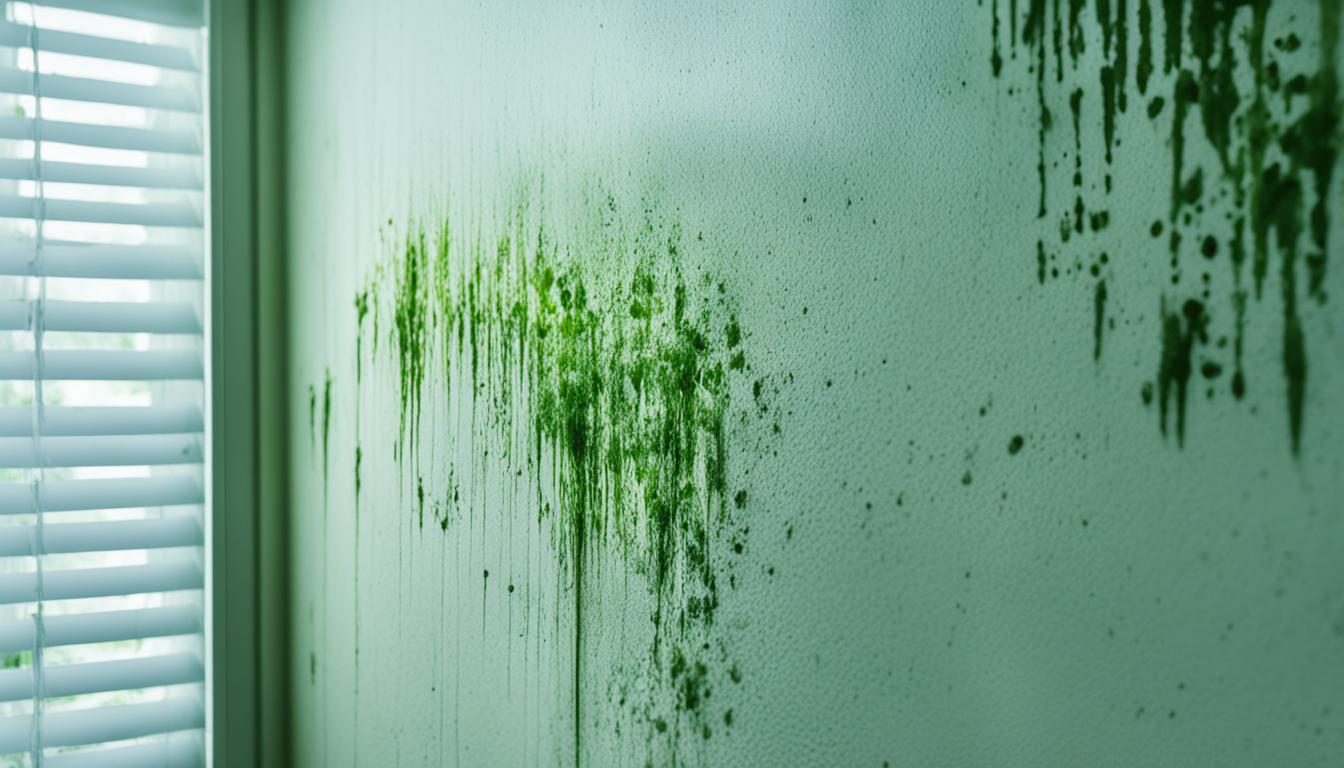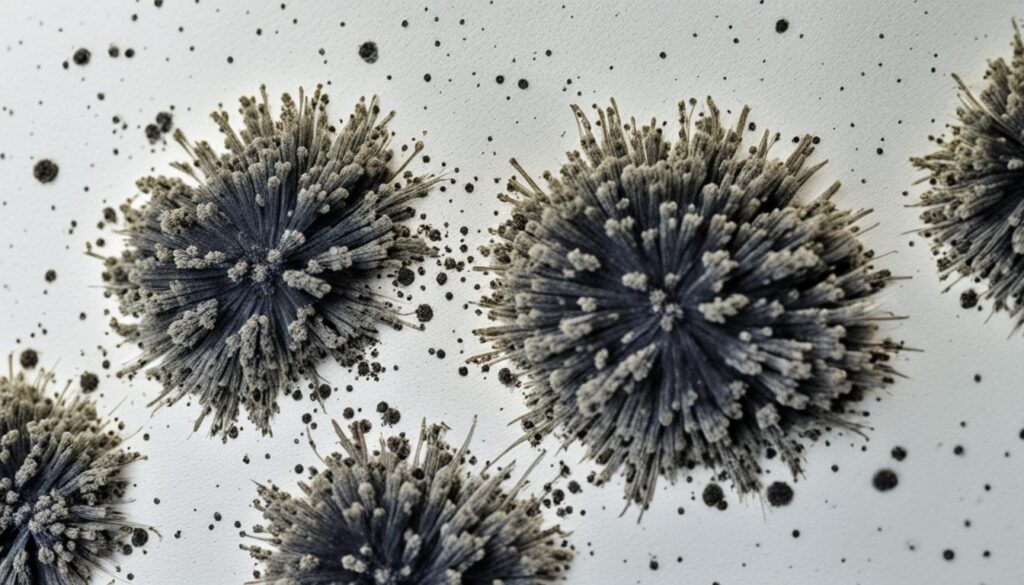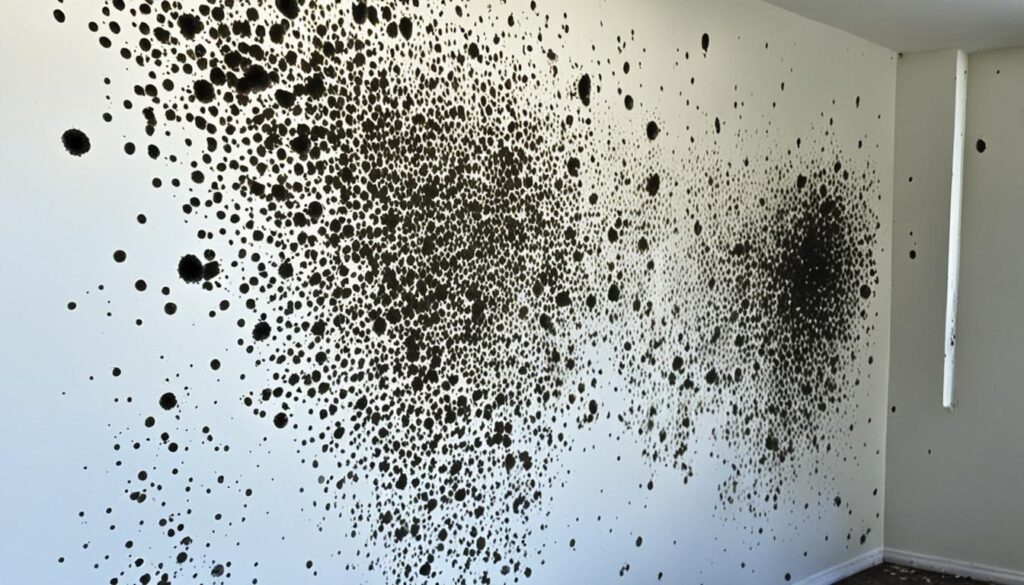
Black Mold Danger Florida: Risks & Safety Tips
Welcome to our informative guide on black mold danger in Florida. The Sunshine State’s warm and humid climate creates the perfect conditions for black mold to thrive, posing significant risks to both your home and health. In this section, we will explore the potential dangers associated with black mold in Florida and provide essential safety tips to protect yourself and your loved ones.
Key Takeaways:
- Florida’s humid climate is conducive to black mold growth, making it a common problem for residents.
- Exposure to black mold can lead to various health issues, including respiratory problems, allergic reactions, and more severe complications for vulnerable individuals.
- Preventing black mold growth through regular inspections, proper ventilation, and moisture control is crucial.
- If black mold is discovered in your home, it is best to seek professional help from trusted mold assessment and remediation experts.
- By taking proactive measures and staying vigilant, you can minimize the risks associated with black mold and ensure a safe living environment for yourself and your family.
Understanding Black Mold in Florida
When it comes to black mold, Florida’s humid climate creates an ideal breeding ground for its growth. Understanding what black mold is and the factors that contribute to its proliferation is crucial for homeowners in the state. This section will delve into the fundamentals of black mold, its affinity for Florida’s environment, and the common signs of infestation. By gaining a better understanding of this insidious fungus, individuals can take proactive steps to protect their homes and loved ones.
Black mold, scientifically known as Stachybotrys chartarum, is a type of toxic mold that thrives in warm, damp conditions. Its dark black color and slimy appearance make it easily recognizable. In Florida, where high humidity levels prevail, black mold can be found in various areas of a home, including bathrooms, basements, and areas prone to water leaks.

The humid climate in Florida provides the moisture that black mold needs to grow. When there is excess humidity or water damage in a home, whether from flooding, leaks, or inadequate ventilation, black mold can flourish. It can spread rapidly, releasing spores into the air that can cause respiratory issues, allergies, and other health problems.
Recognizing the signs of black mold infestation is crucial for homeowners in Florida. Some common indicators include a musty odor, visible dark patches or discoloration on surfaces, and increased respiratory symptoms in residents. If any of these signs are present, it is important to take immediate action to address the issue and prevent further harm.
Areas of a Florida home susceptible to black mold growth
While black mold can grow in various parts of a home, there are specific areas in a Florida home that are particularly vulnerable. These include:
- Bathrooms: The combination of moisture from showers, inadequate ventilation, and water leaks can create an ideal breeding ground for black mold.
- Kitchens: Water leaks from sinks, dishwashers, or refrigerators, coupled with high humidity levels, can contribute to black mold growth.
- Basements: Poor ventilation, high humidity, and potential water intrusion make basements susceptible to black mold infestation.
- Attics: Inadequate ventilation and potential roof leaks can create the damp, warm environment black mold needs to thrive.
A proactive approach to preventing black mold growth involves addressing these susceptible areas and regularly inspecting them for signs of excess moisture or water damage. By keeping these areas clean, dry, and well-ventilated, homeowners can reduce the risk of black mold infestation.
Having a basic understanding of black mold and its preferences for growth is an essential first step in protecting your home against its harmful effects. In the next section, we will explore the potential health risks associated with black mold exposure in Florida.
Health Risks of Black Mold Exposure in Florida
Exposure to black mold in Florida poses significant health risks. The humid climate of the state provides the ideal conditions for mold growth, making it a common problem for residents.
Black mold releases spores into the air, which can be inhaled by individuals. Once inhaled, these spores can cause a range of respiratory and allergic reactions. The severity of these reactions varies from person to person, but they can be particularly harmful to those with pre-existing respiratory conditions, such as asthma, or weakened immune systems.
Common health symptoms associated with black mold exposure include:
- Coughing, wheezing, and shortness of breath
- Nasal congestion, sinusitis, and frequent nosebleeds
- Allergic reactions, such as skin rashes, itching, and eye irritation
- Frequent headaches and migraines
- Fatigue and difficulty concentrating
If you experience any of these symptoms after potential black mold exposure, it is crucial to seek appropriate medical attention. A healthcare professional can evaluate your symptoms, provide a proper diagnosis, and recommend the necessary treatment.
Protecting yourself and your loved ones from black mold exposure should be a priority. Taking preventive measures, such as keeping indoor humidity levels low, addressing any leaks or water damage promptly, and ensuring proper ventilation in your home, can significantly reduce the risk of mold growth.

It is also essential to conduct regular inspections of your property, especially in areas prone to moisture accumulation, such as bathrooms, kitchens, and basements. Promptly addressing any signs of mold growth, such as musty odors or visible mold, can help prevent further spread and minimize health risks.
If you discover black mold in your home, it is crucial to handle the situation safely and effectively. Hiring a professional mold remediation company, like Florida Mold Experts, can ensure proper containment, removal, and cleanup. Attempting to remove black mold yourself can result in the release of more spores and further exposure.
In conclusion, understanding the health risks associated with black mold exposure in Florida is vital for protecting yourself and your family. By being proactive and taking the necessary precautions, you can minimize the likelihood of mold growth and reduce the potential health hazards.
Safety Measures to Protect Against Black Mold in Florida
When it comes to black mold, prevention is key. Taking safety measures to protect your home and your family from the risks associated with black mold is crucial, especially in the humid climate of Florida. By being proactive and following these essential tips, you can significantly reduce the chances of black mold growth in your living space.
Regular inspections play a vital role in staying ahead of black mold. Conduct thorough checks in areas prone to moisture, such as the bathroom, kitchen, and basement. Look for any signs of water leakage or excessive moisture and address them promptly. Additionally, ensure proper ventilation throughout your home to prevent the buildup of excess humidity, which can create a favorable environment for black mold.
Moisture control is another crucial aspect of preventing black mold. Fix any plumbing leaks or water-related issues immediately to minimize the chances of mold growth. Consider using dehumidifiers in areas with high moisture levels to maintain an optimal humidity level. Cleaning up spills and drying wet areas promptly can also help prevent moisture accumulation.
If you discover black mold in your home, it’s important to handle the situation safely and effectively. Wear protective gear, such as gloves and a face mask, before attempting to clean or remove the mold. Use a mixture of water and detergent to scrub the affected area thoroughly. However, if the infestation is extensive or you’re unsure about the proper removal process, it’s highly recommended to seek professional help from reputable mold assessment and remediation experts in Florida like Fix Mold Miami.




